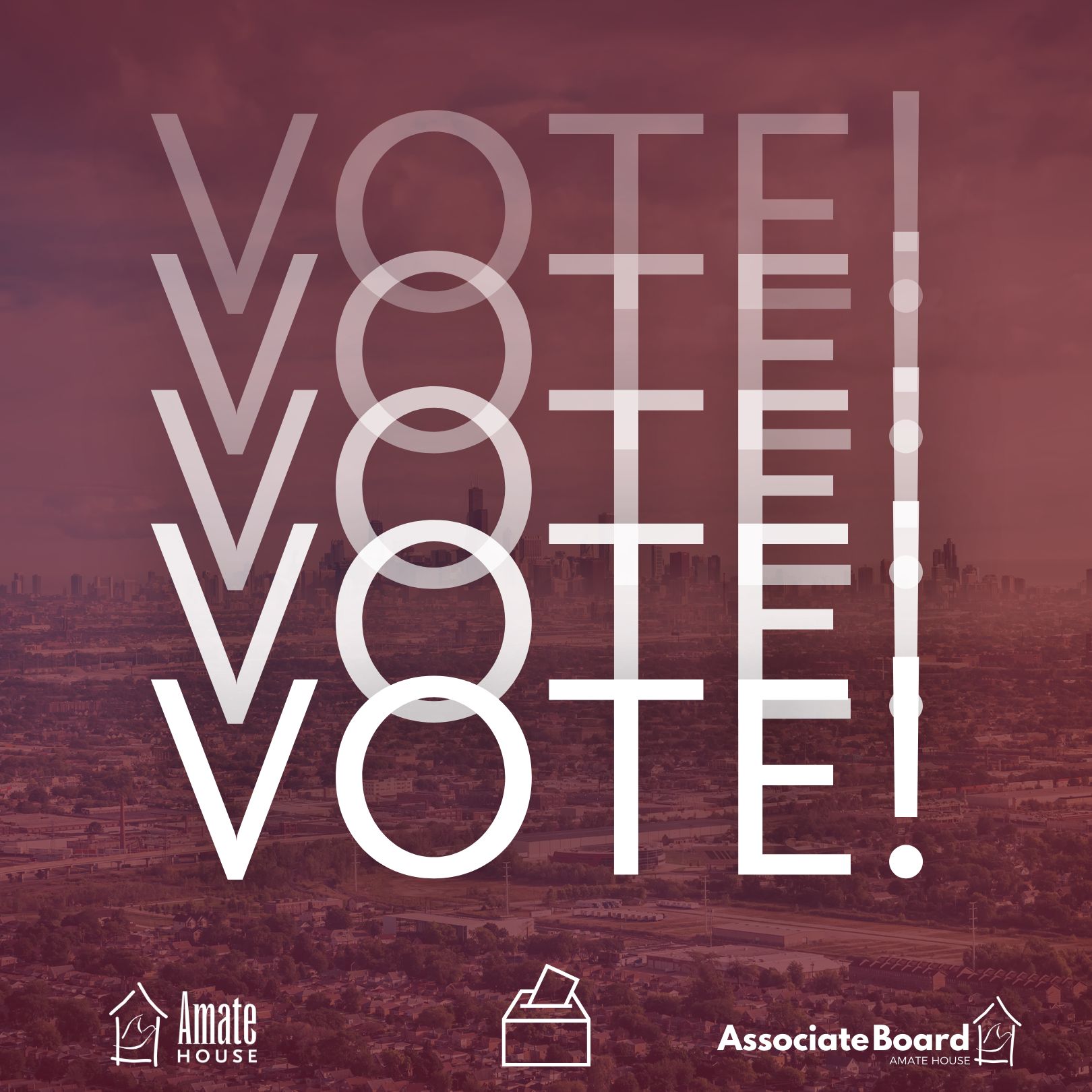Greetings from the Service and Formation committee of the Amate House Associate Board!
As alumni of Amate House, we remain committed to living out the five tenets of Amate: service, community, faith, social justice, and stewardship. The murders of George Floyd and Breonna Taylor as well as calls for the defense of Black life have made it clear that social justice is racial justice. We cannot discuss service, community, faith, social justice, or stewardship without acknowledging privilege, racism, and systemic oppression.
We are committed to promoting reflection, fostering dialogue, and creating action among Amate House’s fellows, alumni, and friends. As such, look for a monthly newsletter detailing how each tenet of Amate House can be informed and requires an antiracist approach. Expect reflections, calls to action, and resources. This month we focus on voting in anticipation of the general election on November 3rd. As Pope Francis says, “a good Catholic meddles in politics.”
Please feel free to reach out with questions, concerns, or topics and areas you’d like to see covered. We are grateful for the opportunity to walk this journey with you.
Black Lives Matter.
Peace,
The Amate House Associate Board Service and Formation Committee
Megan Miller Little Village 2019-2020
Sarah Morris McKinley Park 2019-2020
Tia Rashke McKinley Park 2019-2020
Amy Streit North House 2013-2014

Key questions this month:
How can I request an absentee ballot?
Action items…
Senior citizens make up 61% of poll workers. COVID-19 places senior citizens at a heightened risk and many polling places are struggling to find staff to work. Can you serve as a poll worker this election day? Many states allow those ages 16 and up to work and poll workers are paid for their work.
Utilize your social networks like community Facebook groups, mutual aid societies, or Nextdoor. You can offer community members rides to the polls on those forums or here. If you’ve got a printer, consider offering it up for neighbors to print absentee ballot applications.
Resources to get started…
How can Catholics help lead the fight against racism?
What Black Lives Matter can teach Catholics about racial justice
Fr. Bryan Massingale: How the church can combat racism and white privilege
American Politics & Social Catholicism: Radical, Moderate, and Necessary
Expanding the Definition of Pro Life: By Mari Riffle
What does it mean to be pro-life? With the 2020 presidential election looming on the horizon, this question is more pertinent than ever. Catholics are often told that voting pro-life is an obligation. Indeed–but how do we authentically vote pro-life?
The deaths of George Floyd, Breonna Taylor, Elijah Cain, and far too many others at the hands of police brutality has shown that our nation does not value the lives of Black people the way they are meant to be valued. As people of God, we must proclaim that Black Lives Matter and vote for a candidate who agrees. We must vote for a candidate who will work to end police brutality. This is what it means to be pro-life.
At our borders, immigrants are being detained in concentration camps without adequate medical care during a pandemic. Recently, allegations have been made about the forced sterilization of women within these camps. These actions by our nation are an affront to the humanity of these people. As Catholics, we must be outraged. Furthermore, we are taught that Christ resides within every person, every stranger we meet. How can we ignore Christ being desecrated in such a way? We must vote for a candidate who honors the dignity of immigrants. This is what it means to be pro-life.
The life all around us demands dignity, even nonhuman life. We are charged to be custodians of this earth, to care for its creatures, to nurture its plants. But our earth is ticking towards irrevocable damage due to climate change. Our home is on fire and we must vote for someone committed to putting that fire out. This is what it means to be pro-life.
Christ asks us to act with compassion, to recognize the dignity of life, and to fight for the vulnerable. To limit our care to one vulnerable population is to ignore the fullness and diversity of life that God has created and sanctified.
Others say…
United States Council for Catholic Bishops: Forming Consciences for Faithful Citizenship
Trump and Biden Court Catholic Vote, in Very Different Ways
Father James Martin: Why I am Pro-Life
Equally Sacred Priorities for Voters in the 2020 Presidential Election
Bishop Seitz: Single-issue voting has corrupted Christian political witness
Voting as an Antiracist Act: By Tia Rashke
In this age of reconciling one’s social location with the long-standing racial and economic injustices that pervade the United States’ history, the call of justice goes beyond avoiding the addition of economic disadvantages, social deprivations, and political exclusions. It demands concrete efforts to denounce unjust practices, policies, and laws–past and present–and to advocate for equity-seeking reparations. Popularized by author Ibram X. Kendi, Angela Y. Davis once proclaimed, “In a racist society, it is not enough to be non-racist, we must be anti-racist.”
Beyond psychological, emotional, or physical marginalization and domination on the basis of skin color and perceived ancestry, the term ‘racism’ infers the abuse of institutional power. As such, racism in the United States is born out of European colonialism and its ideological counterpart, ‘white supremacy.’ By rationalizing the country’s origins and the power structures by which it continues to operate, generation after generation of Euro-Americans have protected their group’s position at the top of the racial hierarchy. Abuse and discrimination transformed as new efforts at social, economic, and political suppression were encoded in law. Racist policies have targeted people of color in some cases and excluded them in others. They have provided safety and security and opportunity and wealth and power to the white elite, often at the cost of limiting safety and security and opportunity and wealth and power for people of color. While the history of racism in the United States has arguably had the most compounded effects on Native Americans and African Americans, racial prejudice has long been codified against immigrants of color as well. In addition to Jim Crow and mass incarceration, redlining and gerrymandering, we must also consider how the ideology of white supremacy gave birth to Japanese internment camps and the exploitation of Latin American labor. Such discriminatory and segregationist laws continue to have residual effects decades after they were overturned. And with limited legal oversight and unfair trial practices, unsanctioned racial discrimination and segregation remain common, unchecked realities.
While racism is perpetuated by inaction as much as by action, anti-racism is rooted in intentional actions and expressions. Kendi’s book, How to Be an Antiracist, is clear about everyone’s responsibility to use one’s power–however limited–to challenge and change the racist structures historically upheld in their school, work, and governmental institutions. With the 2020 election already underway, citizens have a unique opportunity to embody what it means to be anti-racist in voting for the local, state, and federal officials who can be held accountable to an anti-racist governmental agenda for the years to come.
Voting is an opportunity to hold politicians accountable for the most broad-reaching expressions of white supremacy, for the harm caused by housing and employment discrimination, education and income inequality, mass incarceration, and anti-immigration initiatives. Faithful citizens are encouraged to educate themselves about each candidate’s past efforts and current assertions in order to evaluate whether their future leadership will fuel further racial discrimination and division or inspire racial reparations and reconciliation. In the process, white Americans are encouraged to acknowledge the ways they too have failed in the past to resist the oppressive cultural norms and systemic practices from which they benefit.
Furthermore, the leaders we elect now will serve as the models for leadership behavior in the future. Children are conditioned through observation of their parents, teachers, and political representatives, replicating the character of those whose words and deeds are rewarded. Do we want to continue indoctrinating future generations into the ideologies of white supremacy and meritocracy, or do we want to un-learn alongside them as they seek a more inclusive and just society than the status quo warrants? To use our voice and our vote is to reject the silence and neutrality of the white moderate who claims to believe in the equality of all but neglects to actively fight for equitable treatment of all. Martin Luther King Jr. acknowledged such as the most common and harmful presence in the American church amid the fight for racial justice in his time, and the retreat of the white voter may prove a similar challenge in our time.
Voting is a privilege not granted to all. Voting suppression and disenfranchisement, again unfairly targeting Black and Brown bodies, are ongoing realities that need to be confronted and serve as motivation. Use what voice and vote you have to center the voices and votes which are systematically decentered in this country’s history and modern society. Catholic Social Teaching doesn’t simply command considering the experiences of the marginalized; rather, it demands the option of the marginalized be regarded as the primary criteria through which actions are taken. “Not being a racist” doesn’t make a difference, but being an anti-racist can! We pray that every vote counts. So, register and request your mail-in ballots or make a plan to go to your local polls.
Others say…
Block the Vote: Voter Suppression in 2020
Voter Suppression is Warping Democracy
Timeline: Voter Suppression in the US from the Civil War to today

